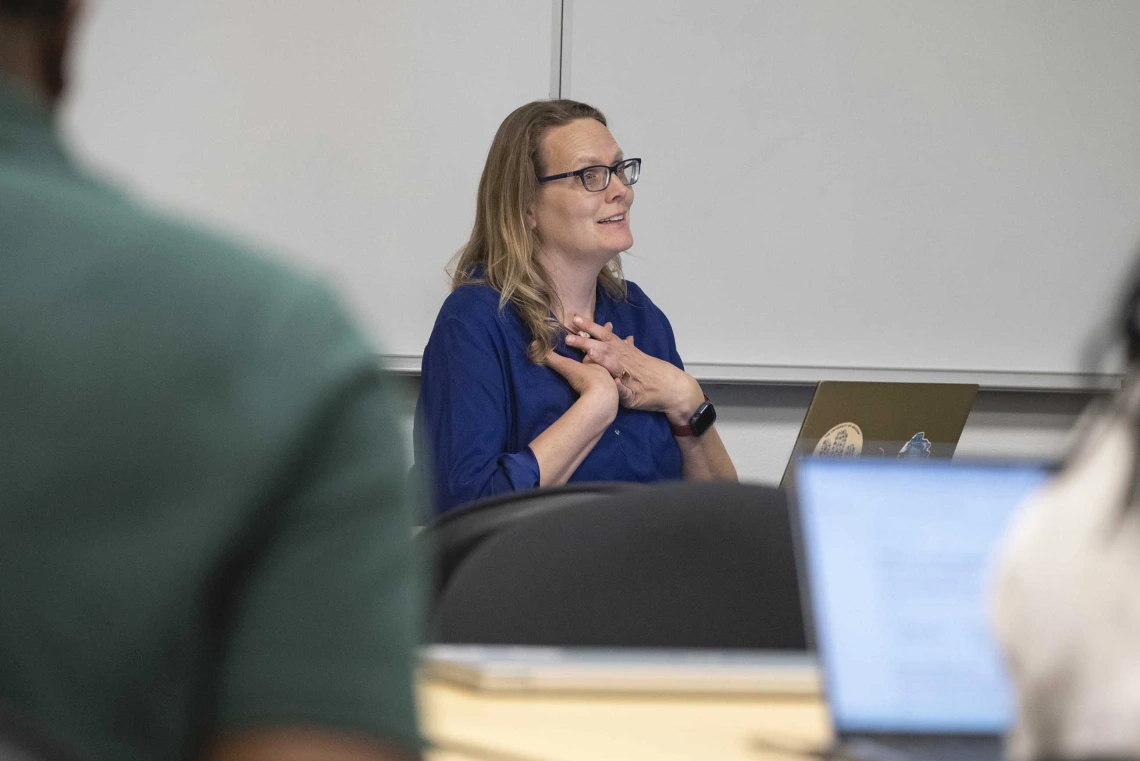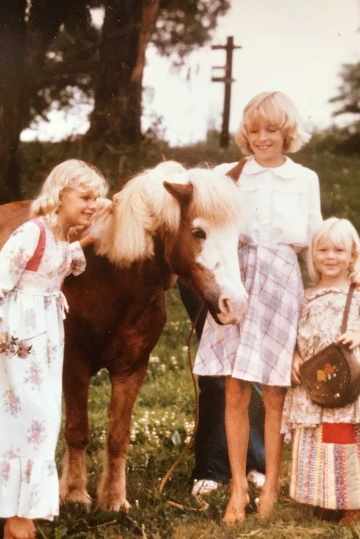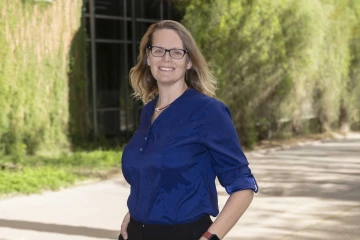Kacey Ernst keeps tackling pressing public health issues
Professor is passionate about studying the intersection between disease and climate.

Kacey Ernst, PhD, MPH, was named Tucson’s Woman of the Year in 2013 for her research on preventing mosquito-borne diseases.
Photo by Noelle Haro-Gomez, U of A Health Sciences Office of Communications
Teenage Kacey Ernst, PhD, MPH, had her life figured out.
She was going to save the world and the Amazon rainforest at the same time.
“I really wanted to become an ethnobotanist-chemist. I thought if I could help find cures for cancer and other diseases in the rainforest in the Amazon, that people would be much more incentivized to preserve it and to protect the environment,” said Ernst, department chair and a professor in epidemiology and biostatistics in the University of Arizona Mel and Enid Zuckerman College of Public Health. “So that was my naive high school dream, that I was going to save the rainforest and help people by discovering medicines.”
In college, Ernst still found herself drawn to studying disease, just in a different way. A captivating lecture lured her to the world of epidemiology — and decades later, smack into the middle of a worldwide pandemic.

Kacey Ernst, far left, had an idyllic childhood on a Missouri farm where the Ernst sisters ran around barefoot and played dress-up with their old pony. Also pictured here, Ernst’s older sister Tawnya Ernst, center, and younger sister Britta Ernst.
Photo courtesy of Kacey Ernst
A game changer
The lecture that changed Ernst’s life happened while she was a student at the University of Michigan. The professor, Mark Wilson, ScD, who went on to become her doctoral advisor, spoke about ecology and the changing environment and the resulting impact on vector-borne diseases, which are caused by pathogens like viruses or bacteria, as well as zoonotic diseases, which spread through the bite of insects like ticks and mosquitoes between humans and from animals to humans.
“I really liked the idea of this interconnectedness,” Ernst said. “There are a lot of complexities with how the environment influences people, vectors and animals and how these interactions shape risks to our health.”
Flash forward to 2020. Ernst, with an MPH and PhD in epidemiology in hand, was still intrigued by the intertwined reality of our environment with its inhabitants. She was researching prevention of the spread of malaria and dengue fever as well as studying Arizona’s increasing vaccination exemption rates.
The mother of three girls, Ernst had an overstuffed calendar between teaching and administrative duties, along with affiliations in several other programs across the U of A campus, including Arid Lands Resource Sciences and the School of Geography, Development and Environment.
Then COVID-19 hit.
“That was really intense,” said Ernst, who was part of the U of A’s scientific advisory team during the pandemic.
Plus Ernst had to keep on top of rapidly evolving research and served as a go-to source for the media.
“I did not get much sleep. You’d look at my calendar, and I’d have four meetings scheduled at the same time, so I’d go to one for 15 minutes and then another for 15 minutes, bouncing from one to the next. It was exhausting.”
It also wasn’t the first time Ernst was swept up in an outbreak.
Tackling threats
Ernst spent her early years “running around barefoot” on a farm in New Franklin, Missouri.
“It was a great way to grow up,” said Ernst.
When she was 8, the family moved to Topeka, Kansas, where she stayed until she headed off to Wisconsin for her undergraduate degree. She hadn’t yet earned her PhD before landing a job in 2003 as the first bioterrorism preparedness coordinator for Milwaukee-Waukesha Counties Consortium. It was post-9/11 and on the heels of anthrax threats scaring Americans.
She was on board during the first detected Mpox — then still known as monkeypox — outbreak in the United States. It was traced to the illegal importation of giant Gambian pouched rats (they can grow up to 3 feet long, including their tails) that spread the disease to prairie dogs, which were sold as household pets. A fair chunk of her time, though, was spent coordinating the infrastructure for bioterrorism response including attending conferences that spelled out the sad but necessary details for handling mass casualties.

Kacey Ernst, PhD, MPH, said she’s heartened by local efforts to build resilience in the face of climate change.
Photo by Noelle Haro-Gomez, U of A Health Sciences Office of Communications
“It was actually a very interesting job, but one that I wish we didn’t have to even have,” Ernst said.
She joined the U of A faculty in 2008 after studying climate change for many years. As temperatures get warmer and the urbanization and deforestation of our environment increase, disease transmission also changes, she said. It’s hard to predict and then study the results of extreme weather events, so Ernst conducts interdisciplinary research with behavioral scientists as well as entomologists and those who work with artificial intelligence modeling and technology. The next step is working with communities — grounded with the scientific information they learn — to develop sustainable interventions at a basic level.
“With so many different, increasing threats that we are facing, communities have to be resilient from the ground up,” Ernst said. “The government will not be able to come save everyone. There are just too many cascading events that occur, and there are only so many resources that can come top down. So, we really need to build that bottom-up capacity through education and outreach to help people understand the dynamics and to figure out strategies to try to engage people in managing the spread of disease.”
And Ernst is just the one to help lead the charge.
“Dr. Ernst has been a trailblazer as a public health educator, advocate and researcher in infectious disease,” said Iman Hakim, MD, PhD, MPH, dean of the Zuckerman College of Public Health. “Kacey stands out as a champion for public health on a global level. She’s building a healthier world for all of us, and we are so fortunate to have her in the college.”
Building resilience
Over the years, Ernst has traveled the world — Mexico, Kenya, Ghana, Indonesia and the West Indies — to understand the dynamics of disease. This summer, she’ll be studying it in her own backyard: She expects to be conducting field work on mosquito-borne diseases in Arizona as she continues to study how to build community capacity to respond to mosquito-borne diseases. Ernst, who was named Tucson’s Woman of the Year in 2013 for such research, said there’s still so much to be learned.
She is one of three faculty leads (along with Joseph Hoover, PhD, an assistant professor in Environmental Science and Mona Arora, PhD, an assistant research professor with the Zuckerman College of Public Health) of the U of A Southwest Center on Resilience for Climate Change and Health, or SCORCH, which was funded by a $3.8 million grant from the National Institute of Environmental Health Sciences two years ago. SCORCH supports cross-disciplinary research and community partnerships to create programs that help underserved communities in hot and dry geographic regions adapt to climate-driven health threats. The hope is that SCORCH’s applied research in the southwestern United States will build knowledge and practices to benefit communities worldwide and boost resilience on a changing planet.
Ernst said she was honored to be asked to contribute a chapter on COVID-19 and climate change in the fifth National Climate Assessment released in 2023.
“It’s heartening to be part of these larger initiatives and groups,” she said. “It’s great to hear about all of the work that’s being done, not just in the health sector but across the board, to understand what the implications are, how we can adapt and how we can innovate and use new technologies to continue to be as healthy as possible as a community.”
Funding for the sixth National Climate Assessment was recently cut, but Ernst is hopeful work will continue.
“Most of the work we do is really linking climate and weather to health outcomes, the climate change is the bigger context, but these studies are typically grounded in our current weather patterns,” she said.
Ernst said she’s encouraged by grassroots efforts.
“My optimism, primarily right now, is growing from local initiatives,” she said. “A lot of cities and some states are committed to climate action adaptation, building community resilience and helping reduce health disparities.”

